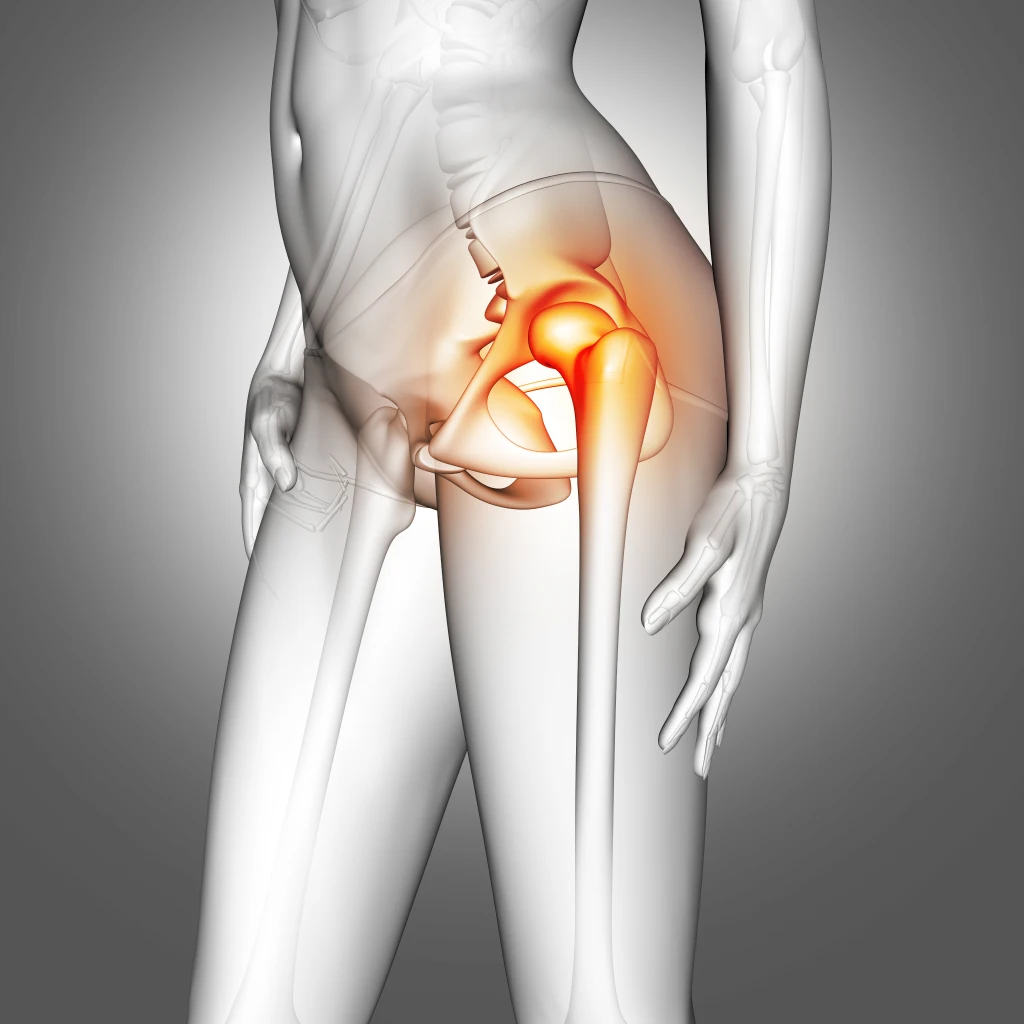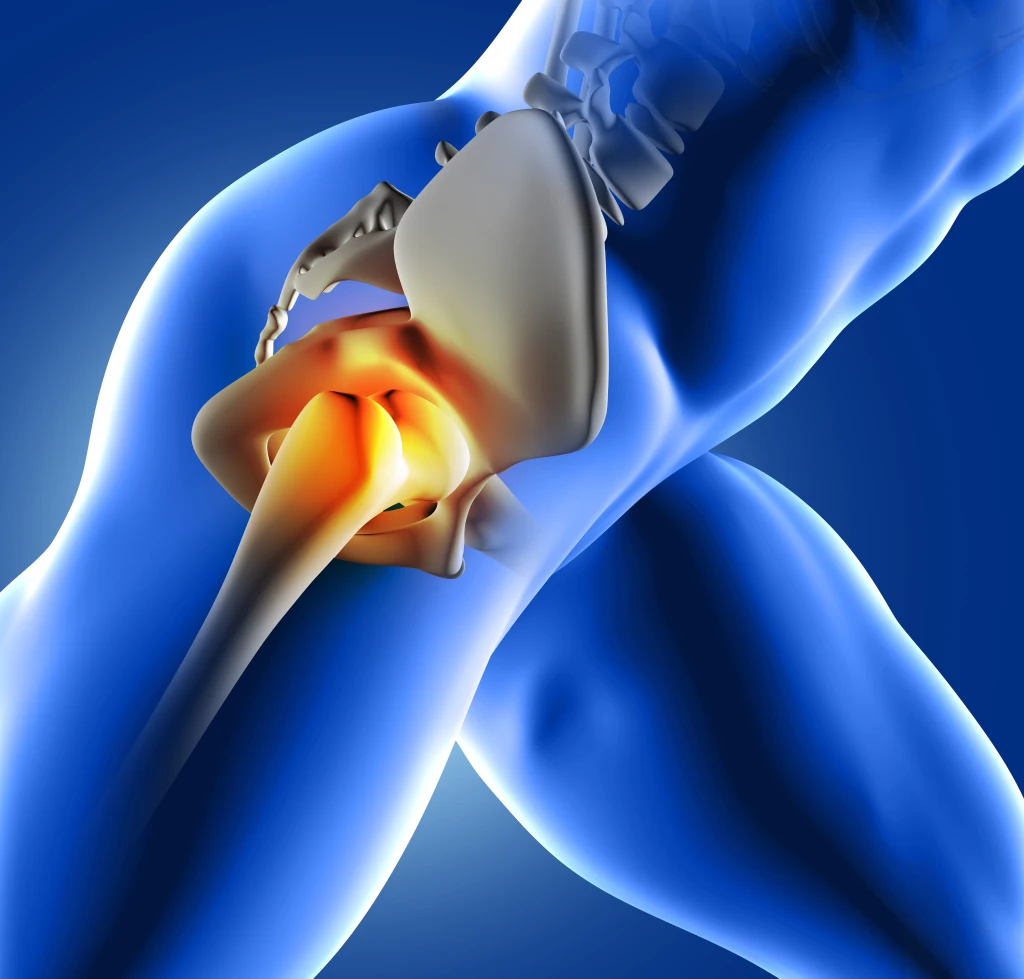Hip joint pain can be a real bother, making simple tasks like walking or bending painful. Hip pain has many causes, from injuries to arthritis or bursitis. Sometimes, the pain can be acute, while other times, it might be a long-term issue. For some patients, hip pain can even interfere with their daily routine.
When the ache becomes too much, seeking medical attention is crucial. Doctors might recommend treatments to strengthen the muscles around the hip or even hip surgery for severe cases. Imaging tests can help diagnose the root cause of the pain, whether it’s a labral tear or avascular necrosis.
The hip joint is a crucial part of our bodies, connecting the thigh bone (femur) to the hip bone (pelvis). It’s a ball and socket joint, allowing for a wide range of motion. Surrounding the bones are soft tissues like muscles and tendons that help support and move the hip.
Sometimes, issues with these soft tissues or the bones can lead to hip pain. Reasons for hip pain can vary, from injuries like hip fractures to conditions like arthritis or labral tears. Other soft tissues around the hip can cause tenderness, too.
For many people, hip pain can worsen over time, especially if left untreated. Physical treatment is often recommended to strengthen fibers and ease pain, and in severe cases, hip replacement might be necessary to replace the damaged joint with a new one.
Pay attention to signals of hip pain and seek further advice if needed, as ignoring it can lead to more significant risks and complications.

When your hip hurts, it can stem from various factors, affecting people differently. It may include:
Hip fractures, which occur when the hip bone breaks due to a fall or injury, resulting in acute hip pain
Hip bursitis
Rheumatoid and Osteoarthritis
Other joints besides the hip can hurt, too
Labral tears
The fall is the apparent cause of the hip pain. It is the same as inflammation, torn ligament, or nerve compression causing aches.

Hip joint injuries can happen for various reasons and can be pretty uncomfortable. These injuries can result from factors like:
Falls or accidents leading to a hip fracture where the bone breaks
Age, with older adults being at a greater risk
Issues with soft tissues surrounding the joint
Leg or groin injuries
While some causes may be obvious, others might require medical attention and treatment to relieve discomfort and promote healing.
Treatment options for hip pain injuries can include rest, physical, or other medical interventions depending on the severity and underlying cause of the pain. Difficulty walking might be due to hip problems. If you feel pain, talk to your doctor.
Hip arthritis might make walking difficult. Arthritis happens when the cushioning between bones wears away, leading to friction and swelling.
Rheumatoid arthritis, an autoimmune disorder, can also affect the hip joint, leading to pain and stiffness. The causes of hip pain can vary, but arthritis is a common culprit, particularly for long-term hip pain.
Symptoms of arthritis can include:
Pain that worsens with movement
Aching and stiffness in the hip area can make walking or performing daily activities difficult.
Developing arthritis in the hip can cause discomfort. Some reasons for hip pain are clear, but others need medical help and treatment to feel better and heal. Treatments for hip pain can involve resting, doing exercises, or getting medical help, depending on how bad it is and what causes it.
Hip bursitis is a condition that can cause discomfort around the hip area. It happens when the tiny, fluid-filled sacs, called bursae, become inflamed. This inflammation can lead to pain and tenderness, especially when moving the hip or putting pressure on it. It can occur due to repetitive movements or overuse, such as prolonged periods of standing or walking, or from sudden injuries.
Symptoms may include:
Pain on the outside of the hip that worsens with activity,
Swelling and difficulty lying on the affected side
Treatment often involves:
Resting the hip
Applying ice packs
Taking anti-inflammatory medications to lessen pain and bulging.
Reduced blood flow to the hip socket can cause avascular necrosis, leading to bone tissue death and hip pain. It can be a reason for hip pain and discomfort. This condition can develop due to various causes, such as:
Trauma
Long-term steroid use
Certain medical conditions.
Symptoms of necrosis may include:
Pain in the hip that gets worse over time
Stiffness and sometimes a popping noise in the joint.
If left untreated, it can lead to more problems like arthritis. Treatments aim to relieve pain and improve mobility.
Hip pain can come from different things like hip dysplasia, fractures, or pain from other parts of the body.
Older adults are at increased risk of hip pain due to age-related changes in the body and joints. Some hip pain causes are easy to see, but others need a doctor to decide the best therapies.
Different methods, like exercise or a new hip joint, can help with hip pain and improve life.
Doctors and physical therapists have different ways to help with hip pain. There are many ways to treat hip pain and other hip problems. The choice of hip treatment depends on the specific cause of the pain and the individual’s signs.
Doctors might check your hip joint well, moving it around and doing tests to find out where it hurts or feels weak.
Imaging tests such as X-rays, MRIs, or CT scans may also be ordered to closely examine the bones, tissues, and structures surrounding the hip joint.
Doctors can find out what’s causing hip pain, whether bones, muscles, or other soft parts, and make a treatment plan just for you.

A physical therapist can find out why you are hurt and make a plan just for you. The therapy helps muscles near the joint with particular exercises and stretches. It makes you more flexible and reduces pain. This can be particularly helpful for conditions like trochanteric bursitis or arthritis.
By targeting the muscles, tendons, and soft tissues, therapy can help reduce pain and prevent further injury. Physical therapists can use hands-on therapy and things like heat or ice to help with pain, healing, and exercises.
When you work with a physical therapist, they can show you how to move right and do things in a way that stops hip pain and keeps your joints healthy.
Changing how you live can be a game-changer for you.
Do exercises to make your muscles stronger and more flexible. This can stop pain and keep you from getting hurt again.
Walking, swimming, and stretching can help keep your hips moving well.
Additionally, saving a healthy weight can help alleviate pressure on the hip and reduce strain.
Don't sit too long or do exercises that hurt your hips.
Using good shoes and sitting up straight can help keep your hips healthy.
By changing how you live, you can take control of your hip problem and feel better every day.
Medication helps with hip pain, especially if physical therapy or surgery isn't enough. It can make hip joints less painful and swollen, so moving around gets more comfortable and life improves.
A standard medicine for hip pain is anti-inflammatory drugs. They help with swelling and discomfort, especially from conditions like osteoarthritis.
Pain relievers, such as acetaminophen or opioids, may also be prescribed to help manage pain when it gets worse. Sometimes, medicines can focus on specific problems causing hip pain. For example, muscle relaxants can help tighten muscles, and some medicines can strengthen bones and tissues.
Talking to your doctor about what medicines are suitable for you is essential. They can help you figure out the best plan for treating your symptoms.
Treatment for hip pain may involve hip replacements.
Hip replacement surgery is a big operation that helps with bad hip pain and not being able to move well, especially when other treatments don't work.
During the surgery, the damaged parts of the joint are removed and replaced with artificial components to create a new joint. It helps alleviate pain caused by osteoarthritis by providing a smooth surface for movement.
After the surgery, patients usually do exercises to keep their hip muscles strong, move better, and get back to normal in their legs and body.
When a new joint replaces the old one, people can move better and feel less pain.
Therapy means giving medicine straight to the sore spot to make the pain and swelling go away. This treatment is commonly used for tendinitis, where the tendons become inflamed and painful.
The injected medications, like corticosteroids or hyaluronic acid, reduce swelling and ease pain. This therapy targets the problem areas, helping people manage pain and feel better in their daily lives.
Also, this way of doing things doesn't need a big operation and can be done without staying in the hospital, which is more accessible for many people.
Preventive measures are essential for maintaining hip health and minimizing the risk of injuries. Individuals can better support the joint and prevent discomfort by keeping muscles strong and flexible.
01
Exercise Regularly: Physical activity, such as walking, swimming, or cycling, can help strengthen hip muscles and improve joint function.
02
Use Proper Techniques: When lifting heavy objects or engaging in physical activities, use proper body mechanics to avoid hip injuries.
03
Stay Active: Avoid prolonged periods of inactivity, which can contribute to hip stiffness and discomfort.
04
Maintain a Healthy Weight: Excess weight can strain the hip joint, increasing the risk of hip pain and arthritis.
If your hip hurts a lot or you can’t walk well, you must see a doctor immediately. Whether your pain comes on suddenly, stays for a long time, or seems severe, it’s best to talk to a doctor as soon as possible.
Delaying medical evaluation can lead to worsening conditions or complications. Doctors can quickly find out what’s wrong, treat you properly, and help fix the problem.
Making sure to see your regular doctor or go to the ER quickly helps you stay healthy and feel good.
Hip pain can come from injuries, arthritis, or bursitis, affecting anyone. By knowing why it hurts and treating it right, we can feel better, move more accessible, and have a better life.
If experiencing hip pain or related symptoms, seeking medical evaluation and exploring treatment options tailored to individual needs for optimal relief and recovery is essential.
Located in Valley Stream and Brooklyn, we are committed to excellence by pledging to provide the highest quality of orthopaedic care possible.
© Copyright 2023 Advanced Orthopedics & Joint Preservation, PC. All Rights Reserved